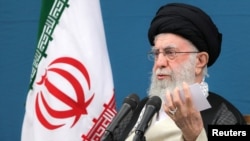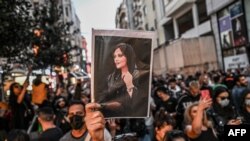
India has condemned comments made by Iran's Supreme Leader Ali Khamenei on the treatment of Muslims in the South Asian nation, calling his remarks "misinformed and unacceptable."
"We cannot consider ourselves to be Muslims if we are oblivious to the suffering that a Muslim is enduring in Myanmar, Gaza, India, or any other place," Khamenei said in a social media post on Monday.
In response, India's foreign ministry said it "strongly deplored" the comments.
"Countries commenting on minorities are advised to look at their own record before making any observations about others," the foreign ministry spokesperson said.
The two countries have typically shared a strong relationship, and signed a 10-year contract in May to develop and operate the Iranian port of Chabahar.
India has been developing the port in Chabahar on Iran's southeastern coast along the Gulf of Oman as a way to transport goods to Iran, Afghanistan and central Asian countries, bypassing the ports of Karachi and Gwadar in its rival Pakistan.
Khamenei, however, has been critical of India in the past over issues involving Indian Muslims and the troubled Muslim-majority region of Kashmir.







